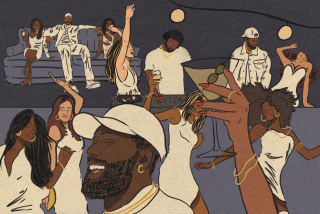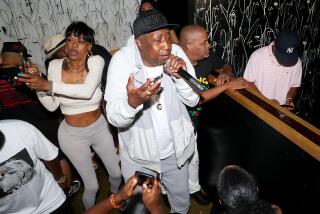Book review: ‘The Big Payback: The History of the Business of Hip-Hop’ by Dan Charnas
“Here’s a little story that must be told,” Dan Charnas writes by way of an ironic introduction to his brick-sized epic, quoting a classic rap lyric. “The Big Payback” is ostensibly the history of the business of hip-hop, but in its ambitious scope (it starts with no less than America’s first treasurer, Alexander Hamilton) and exhaustive detail (what songs were played on Harlem’s 125th Street the eve of Obama’s election), Charnas’ 660-page book ends up being one of the most comprehensive, and certainly one of the longest, printed accounts of the music itself.
That intertwining of commerce and art is one of the author’s main points: Since the day Sylvia Robinson gathered a bunch of strangers in a Harlem studio and — voila! — created the first hit rap group (the Sugarhill Gang), the story of hip-hop has been a story of hustlers. It’s also a story of the transcendence of race in post-civil-rights-era America — that’s Charnas’ other main point. On both counts, despite some extraordinarily ugly incidents and chump moves along the way, it’s a phenomenal success story.
Charnas is a Columbia-trained journalist who also spent years inside the industry, working for pioneering producer-entrepreneur Rick Rubin and others. His time embedded in a tumultuous, momentous environment doesn’t so much compromise his objectivity (though Rubin does get a lot of love) as allow him to get the kind of juicy details no one else has reported — the boardroom brawls, the moguls who mentored.
Charnas has a fine sense of both the macro and the micro. Having interviewed more than 300 people, the writer meticulously reports specifics, not vague rumors. Frustratingly, it’s not generally clear where the details come from: The publisher apparently ran out of room for endnotes, and the ones promised online are nowhere to be found.
Not surprisingly for a book on business, Charnas crunches a lot of numbers. But “Payback” isn’t all about the Benjamins. Mostly, it’s a character-driven narrative, with a colorful roster of innovators and gangsters. There’s Robinson, the child star turned beat-maker turned fallen entrepreneur; Russell Simmons, the playboy turned activist; Lyor Cohen, the Israeli immigrant turned king of the record industry. Charnas gets pretty deep inside these players’ life stories and heads. He covers the prehistory of rap until the near present, from block parties to clubs to studios to indies to majors to radio to street teams to soda sponsorships to ringtones. If you have any interest in the music business or hip-hop, “The Big Payback” is a must-read.
Sure, it’s at least 100 pages too long. We don’t need all that prehistory, or the complete story of the rise of longtime Power 106 DJs the Baka Boyz (for whom Charnas also worked). That said, there are elements missing. The book is coast-centric, focusing on East and West and largely ignoring Atlanta, Houston, Miami, etc. It’s not always balanced: Warner Music Group’s Cohen gets a lot of ink but Jimmy Iovine, head of Interscope, not enough.
Sometimes Charnas gets lost in the trees. But usually he’s able to telescope out and give us a bigger picture. His observations are often astute. Jay-Z, he writes, has “the soul of a poet, and the instincts of a killer.” Charnas reports but doesn’t belabor the violence that has famously dogged rappers and their patrons. “The fortunes of many businesses throughout American history were forged in blood. The titans of the hip-hop business in the mid-nineties were no exception,” he writes.
Charnas is unabashedly a hip-hop head and sometimes, he lets his heroes off easy. He reports that the seminal label Def Jam exploited some artists egregiously, paying Public Enemy, for instance, half the normal royalty rate, but he never asks founders Rubin and Simmons why.
As the book’s title indicates, Charnas sees Simmons, Rubin and their ilk as having fought and won a much bigger battle: To storm and wipe out the racial divides upon which the American music industry had been structured since its inception. At Def Jam, a Jewish producer and a black promoter came together to make No. 1 records by LL Cool J and the Beastie Boys. Artists such as Jay-Z and P. Diddy don’t record just for the black divisions of record companies; they are mainstream pop stars who also became multimillionaire executives.
Charnas wants to see hip-hop as a post-racial triumph, but sometimes his own cultural bias as a white man seeps through. He’s kinder to Rubin than to Simmons, to Cohen than to Damon Dash. That doesn’t undermine his chief argument, that “hip-hop has done as much for the economic, political, and social advancement of Black America as any cultural movement in history. ... In so doing, hip-hop set all of America free.”
McDonnell is the author of “Mamarama: A Memoir of Sex, Kids, and Rock ‘n’ Roll” and an incoming assistant professor of English at Loyola Marymount University.
More to Read
The biggest entertainment stories
Get our big stories about Hollywood, film, television, music, arts, culture and more right in your inbox as soon as they publish.
You may occasionally receive promotional content from the Los Angeles Times.






